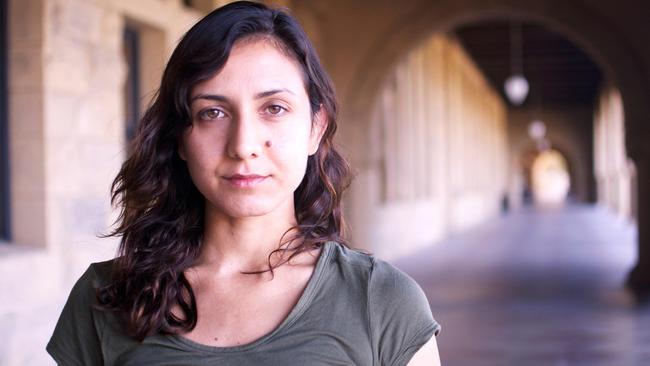Ottessa Moshfegh’s short stories: empathy, brutality in squalid world
We’re foul and fallen beasts, and the fiction of Ottessa Moshfegh provides our age with a defining act of portraiture.

We’re foul and fallen beasts, broken in body and brain, and the fiction of Ottessa Moshfegh provides our age with a defining act of portraiture. Her writing blooms with physical deformity — foul scents, rotting teeth, misshapen bodies — and the kind of delusions and daydreams that conspire to keep the heart a lonely hunter.
But what in lesser hands may operate as a gawking cruelty registers here as empathy: a doctor telling no lies to a sick patient who has convinced themselves of health. As one of the narrators puts it, judging a similarly addled family member: “I’m not saying he was an idiot. He was just like me: anything good made him want to die. That’s a characteristic some smart people have.”
That combination of self-loathing and self-regard is the American writer’s register. Of the 14 stories in Homesick for Another World, 11 employ a variation of the same voice: call it the first-person blustery melancholic. While some fiction writers use the short form as a kind of laboratory for experiments in perspective and tone, Moshfegh narrows her focus, seeking nuances within established forms. While reserving the freedom of the third person for certain stories — tellingly, all involving older men horrifically misjudging women — the dominant style here is intimate and slightly broken.
The tone is set immediately in the outstanding first story, Bettering Myself. Detailing the daily routine of a divorced alcoholic high school teacher, it’s a showcase for many of Moshfegh’s tics and tropes: the near-epiphany ending, the casual vulgarity, the strategically tamped-down sorrow.
The voice aims to shock, hoping to avoid despair. (“Most people have had anal sex,” I told them. “Don’t look so surprised.”) The tension between the visible ruin of a protagonist’s life and the nonchalance they feign in describing that life is the real drama, and a potentially unresolvable one.
Similar woes beset the figures in Slumming and A Dark and Winding Road. On first glance the kind of compactly anomic stories often featured in The New Yorker (a regular publisher of Moshfegh’s work), they quickly darken beyond initial expectations.
In the first, an educated middle-aged woman spends her holidays among the hopelessly poor and drug addicted. Self-aware enough to consider herself alien in these surroundings, yet lacking the resolve to shape this knowledge into a better life, she shares a fatal flaw of many in this collection: clarity of vision doesn’t save them but allows them only a more exacting anatomy of their failures.
For the put-on artist at the centre of Road, his games hide a more terminal dilemma. The revelations come as asides, casually deployed (“I never dared to smoke by myself at home, lest I throw myself from our twelfth-story window.”)
But Moshfegh’s protagonists don’t just view themselves without pity. The world is regarded with similar dispassion. For the widower in No Place for Good People, passing time in a “residential facility for adults with moderate developmental disabilities”, it’s a matter of simple honesty. (“You can call them ‘retarded’ — that word doesn’t offend me as long as it’s used in the proper way, without pity.”)
This could almost double as the book’s artistic credo, it’s writing unsullied with pandering or bromidic niceties. However, there are times when this willingness to regard the squalid and scuzzy without flinching descends into a kind of skid row cartoonishness, such as in The Weirdos. It’s a crackpot world of lucky crystal skulls and shat-upon losers, but the reader struggles to find the usual smuggled empathy amid the garish vulgarity.
Despite occasional missteps, this is writing of enormous skill and nuance. Moshfegh’s prose works hard to disguise its artfulness — her narrators regularly pepper their narration with demotic junk and rehearsed interruptions, all the better to scuttle the fine surface of the standard “high style” of much literary fiction.
In fact, so finely judged is this voice that when a more formulaic “evocative” phrase is used — “The whole city felt hushed, focused, like a young dancer counting her steps” — it feels shipped in from another writer. Her best sentences accrue subtly, in grimy details and surreal perfection. My favourite arrives in The Beach Boy, another story about an aimless widower: “He spent his days in silence, eating duty-free Ferrero Rocher chocolates and bouncing the strings of Marcia’s squash racket against his skull.” If there’s a sentence that captures the banality of mourning more acutely, I look forward to reading it.
Despite the Man Booker Prize shortlisting of last year’s novel Eileen, Homesick is a truer display of Moshfegh’s talent. The earlier work, despite stretches of vivid character description and a coldly perfect tone, felt like an overfed short story needlessly delaying its conclusion. No such problems plague this new book. These are brutal and compressed tales, without fat yet not, perhaps, without hope.
Considered as a community, these portraits sound out a note of muted bravery, illusionless yet persistent. Just over 60 years ago in Seize the Day, Saul Bellow looked out over Broadway and gave voice to a sea of singulars: “I labor, I spend, I strive, I design, I love, I cling, I uphold, I give way, I envy, I long, I scorn, I die, I hide, I want.”
Moshfegh’s chorus sings likewise, adjusted for the contemporary: “I guess I have a lot of emotion stored up. But it’s nothing bad. It’s love. It’s just love rotting up inside of me.”
Adam Rivett is a writer and critic.
Homesick for Another World
By Ottessa Moshfegh
Jonathan Cape, 304pp, $39.99 (HB)


